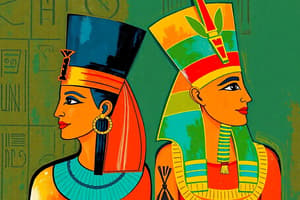Podcast
Questions and Answers
What is Nefertiti most famous for?
What is Nefertiti most famous for?
- Her role in the military
- Her relations with foreign leaders
- Her many architectural achievements
- Her limestone bust (correct)
Which of the following statements about Ramses II is TRUE?
Which of the following statements about Ramses II is TRUE?
- He declared himself a god and was known for his modesty.
- He was known for his artistic contributions more than his military prowess.
- He ruled for 50 years and had 76 children.
- He fathered a significant number of children and ruled for an extended period. (correct)
What characterized Cleopatra VII's leadership style?
What characterized Cleopatra VII's leadership style?
- She navigated a complex political landscape with skill. (correct)
- She was primarily known for her beauty and charm.
- She focused solely on personal wealth and power.
- Her leadership was marked by military conquests.
What was a consequence of Akhenaten's death regarding Egyptian religion?
What was a consequence of Akhenaten's death regarding Egyptian religion?
What event marked the end of Cleopatra's reign?
What event marked the end of Cleopatra's reign?
What significant action did Hatshepsut take to establish her legitimacy as pharaoh?
What significant action did Hatshepsut take to establish her legitimacy as pharaoh?
What is Khufu best known for during his reign?
What is Khufu best known for during his reign?
Which of the following describes Thutmose III's military reputation?
Which of the following describes Thutmose III's military reputation?
What was Akhenaten's original name before he changed it?
What was Akhenaten's original name before he changed it?
Which god did Akhenaten worship as the one true god?
Which god did Akhenaten worship as the one true god?
Why did Akhenaten move the capital from Thebes to Amarna?
Why did Akhenaten move the capital from Thebes to Amarna?
How did Hatshepsut's rule impact Egypt's trade?
How did Hatshepsut's rule impact Egypt's trade?
Who was the strong presence and significant figure during Akhenaten's reign?
Who was the strong presence and significant figure during Akhenaten's reign?
Flashcards are hidden until you start studying
Study Notes
Hatshepsut
- Second woman to become pharaoh, reigning during the Eighteenth Dynasty.
- Wife of Thutmose II and assumed power after his death in 1479 BC, co-regent with her young step-son Thutmose III.
- Claimed divine legitimacy by stating her mother was visited by the deity Amon-Ra during pregnancy.
- Accomplished ruler known for re-establishing trade routes and maintaining peace.
Khufu
- Fourth Dynasty pharaoh renowned for constructing the Great Pyramid of Giza, one of the Seven Wonders of the World.
- The pyramid served as his "stairway to heaven" and stood as the tallest man-made structure for approximately 4,000 years.
- Represents the advanced architectural capabilities of Ancient Egypt.
Thutmose III
- Step-son of Hatshepsut, took full control as pharaoh after her death in 1458 BC.
- Distinguished himself through military training; regarded as a military genius and often referred to as the "Napoleon of Egypt."
- Achieved a record of never losing a battle, earning widespread respect as possibly the greatest pharaoh.
Akhenaten
- Son of Amenhotep III, originally named Amenhotep IV, changed to reflect monotheistic beliefs focused on Aten, the Sun God.
- Moved the capital from Thebes to Amarna, renaming it Akhetaten ("Horizon of Aten"), marking the city's emergence.
- His wife, Nefertiti, played a crucial role in his religious reforms, known for her iconic limestone bust.
- Following his death, Egypt reverted quickly to polytheism, abandoning the beliefs he established.
Ramesses II
- Known as Ramses the Great, he ruled during the 19th Dynasty, marking his period with opulence and extensive military campaigns.
- Son of Seti I; had a co-regency with him before taking sole power, ruling for 67 years.
- Declared himself a god and had 96 children, leaving a vast architectural legacy.
- His reign ultimately strained Egypt's economy, leading to near-bankruptcy by the end of his life.
Cleopatra VII
- The final active ruler of the Ptolemaic Kingdom of Egypt, known for her intelligence and political acumen during turbulent times.
- Despite romanticized portrayals, she was an effective leader who sought to stabilize and revitalize her empire.
- Had well-documented relationships with Julius Caesar and Marc Antony; her suicide on August 12, 30 BC, symbolized the end of the Egyptian empire.
Studying That Suits You
Use AI to generate personalized quizzes and flashcards to suit your learning preferences.




